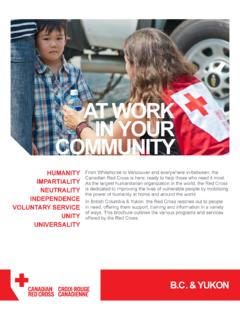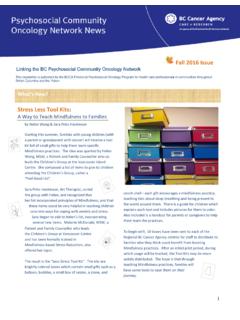Transcription of The Courts of BC
1 The Courts of BCHandouts for Studentsii Courts OF BC Teacher s GuideTable of ContentsGetting Started .. A1 Access to the Courts .. A2 Judicial Independence .. A3 Civil Law .. A4 Criminal Law ..A5 Provincial Court of BC .. A6 Supreme Court ofBC ..A11 Court ofAppeal for BC .. A15 APPENDIX B8 Handouts for StudentsYou can use these handouts as class notes for your students. It is rec-ommended that the students read them prior to each lesson. You willfind the PDF files under Handouts for Students on the They include the following: Courts OF BCTeacher s Guide A1 Types of CourtsDo you know what types of Courts operate in british columbia ? Trial?Appeal? Or Both?Did you say both? Good answer.
2 Yes, here in BC, we have two trial courtsand one appeal court. Depending upon the type of case, trials are held in either the ProvincialCourt of BC or the Supreme Court of BC. The judges in these Courts hearevidence from each side and decide in favour of one. These are called a decision, one of the parties may be unhappy with the outcomeand believe that the judge came to a wrong decision. Under certain con-ditions, that party may be able to go to the Court of Appeal for BC wherethree or five judges can either accept or reject the appeal. The appeal process does not have to stop there. The Supreme Court ofCanada can hear appeals from the Courts of Appeal in every province, in-cluding BC. The Supreme Court of Canada has the last word, though.
3 Allcourts in Canada must follow the decisions of the highest court in theland. Who runs the Courts ?Both the federal and provincial governments are involved in BC s courtsystem. The Government of Canada appoints and pays the judges of the SupremeCourt of BC, the Court of Appeal for BC and, of course, the SupremeCourt of Government of british columbia appoints and pays the ProvincialCourt judges and the Masters of the Supreme Court of BC, the peoplewho decide on pre-trial matters. It also pays for and administers all threeBC Courts through the Court Services Branch. This branch enables BC Courts to run smoothly. Its employees keep thecourt registry of documents, supply all the support services required torun the Courts , escort prisoners to court, keep prisoners in custody whilein court and maintain courthouse security.
4 The Court Services Branch alsoprovides for and maintains courthouse facilities. Want to learn more? This is just a start. Courtprocesses can be fascinat-ing and very differentfrom what you may haveseen on television or inmovies. You can learnmore about the individualcourts, civil and criminallaw, judicial independenceand access to the Courts StartedA2 Courts OF BC Teacher s GuideAn Open Society Means Open CourtsOpen Courts mean that we can see first hand how our rights as citizensare protected. They also remind us that justice comes first before anyindividual special interests. As a citizen, you have the right to visit Courts and observe them in very few exceptions, all Courts are open to the public.
5 You are wel-come to sit in a reserved space called the public gallery and watch whathappens. You can pass a very interesting day this way and learn a lotabout how our society operates. You can even represent yourself in court. Most people, though, prefer tobe represented by a lawyer, especially if the matter is serious. It is proba-bly a better idea to do your learning from the gallery than in front of ExceptionsIn certain cases, a court may be closed. This happens most often to pro-tect the rights of children. For instance, if a young child is giving evidencein a sexual assault case, the judge can restrict access to the courtroom forthat part of the trial. Sometimes, the trial judge orders a ban on publication. This means thatmembers of the news media are not allowed to report on some aspectsof the trial.
6 For example, the identity of an undercover police officer mightneed to be protected, so newspapers or radio stations wouldn t be ableto report the name of the with a publication ban, the public is still entitled to watch the casein the courtroom. This is an entirely open process. HANDOUT8 Access to the CourtsAs a citizen, you havethe right to visit courtsand observe them inaction. With very fewexceptions, all courtsare open to the OF BCTeacher s Guide A3If you only remember one thing about our justice system, remember this:Even though our governments pay for everything, our Courts and judgesare independent of government. No government can tell a court or judgehow to decide a case. Judicial independence is the cornerstone of our justice system.
7 Judicial in-dependence means that judges are free to make their decisions withoutinterference or influence from any source, including elected officials likeMembers of the Legislature or Members of Parliament. Even the PrimeMinister of Canada cannot influence a court decision. Judges have a responsibility to listen to both sides of the case and then tomake impartial, fair decisions based on the evidence and the law. If a judge felt pressure from the government to decide the case in a par-ticular way, that could be very unfair to anyone with a competing inter-est in the case. The rights of individual citizens would not be protected. The judge has to feel free to make the right decision - the decision that isconsistent with the facts and the law - even if the judge knows that thedecision may be unpopular.
8 Even though they are independent, judges are still accountable for theirdecisions through the appeals process. Their decisions can be examinedby a higher court. Judges are also responsible to the Courts . A judge would never refuse tohear a case because it was going to be difficult or unpopular, but occa-sionally a judge has to refuse to hear a case because she or he has somesort of prior connection with one of the parties, or some other conflict the conflict is slight, the judge may disclose the connection toboth parties and allow the lawyers in the case to raise any concerns theyhave with the judge continuing to hear the case. It s important that bothparties feel confident that the judge will be impartial. For example, if thecase involved the judge s neighbour, then the neighbour or the judgemight feel uncomfortable with the judge hearing the case because theyhave a relationship outside the courtroom.
9 Judges may be appointed at any age. Federally appointed judges canserve until the age of 75. Provincial Court judges may work until the ageof 70. HANDOUT8 Judicial IndependenceIf you only remember onething about our justicesystem, remember this:Even though our govern-ments pay for everything,our Courts and judges areindependent of govern-ment. No governmentcan tell a court or judgehow to decide a case. A4 Courts OF BC Teacher s GuideHow Are Civil Cases Started? A civil case gets started when one party files court documents calledpleadings. Then, the other party can file their own documents to presenttheir position. Whoever starts this process is called the plaintiff, claimantor the petitioner. The party on the other side is called the defendant orthe respondent.
10 A style of cause shows who is suing and who is beingsued. If your last name was Jones, for example, and you were suing some-one named Smith, the case would be called Jones v. Smith. You wouldbe the plaintiff and Smith would be the defendant. You or Smith could decide to represent yourselves. Or, you could hire alawyer to represent you in Are Civil Cases Decided? Courts would try to help you and Smith find your own solution, but if thatdidn t work, then the court would decide the outcome of the case. Civil cases are heard at all court levels. If your case involved a claim of$25,000 or under, it could be brought to the Small Claims in theProvincial Court of BC. They generally cost less money and take less timethan trials in Supreme your case involved a larger claim, it could be heard by a judge or juryin the Supreme Court of BC.




